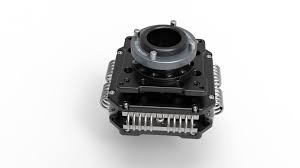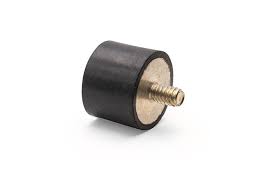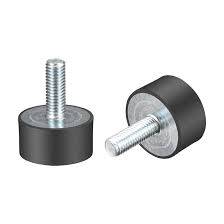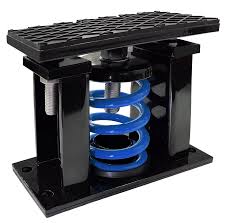Maximizing Engine Performance with Vibration Isolators
Engine vibration isolators are crucial components in maximizing engine performance and efficiency. Vibration isolators serve to reduce the detrimental effects of engine vibration on the overall functioning of the engine. By effectively isolating and dampening the vibrations produced during engine operation, these components help to minimize wear and tear on engine parts, improve fuel efficiency, and prolong the lifespan of the engine. In this article, we will explore the importance of engine vibration isolators in maximizing engine performance, and how they contribute to the overall smooth operation of a vehicle. We will also delve into the various types and designs of vibration isolators available, and their impact on engine performance.
Vibration isolators are used to reduce the amount of vibration that is transmitted from a running engine to the surrounding structure. By minimizing the transfer of vibrations, the engine's performance is maximized, as excessive vibration can lead to wear and tear on engine components, decreased effectiveness, and increased maintenance costs. Isolators can be specifically designed to handle the frequency and amplitude of the engine's vibrations, ensuring optimal performance and reducing the risk of damage to surrounding equipment or the engine itself. Properly chosen and installed vibration isolators can improve engine efficiency, reduce noise, and increase overall longevity.
Vibration isolators are essential for maximizing engine performance as they help to reduce the amount of vibration transmitted from a running engine to the surrounding structure. By minimizing the transfer of vibrations, these isolators effectively prevent wear and tear on engine components, which can lead to reduced effectiveness and increased maintenance costs. The isolators can be specifically designed to handle the frequency and amplitude of the engine's vibrations, ensuring optimal engine performance and reducing the risk of damage to surrounding equipment. With properly chosen and installed vibration isolators, engine efficiency can be improved, noise reduced, and overall longevity increased.
Understanding the Importance of Engine Vibration Isolators

Engine vibration isolators are crucial components of a vehicle's engine system. They are designed to minimize the transmission of vibration from the engine to the rest of the vehicle, including the chassis and the passenger cabin. This serves several important purposes, including reducing noise and increasing passenger comfort. In addition to the comfort and noise reduction benefits, engine vibration isolators also help to protect the engine and other components from excessive wear and tear. By dampening the vibrations produced by the engine, isolators can help to prolong the lifespan of various engine parts and reduce the likelihood of mechanical failure. Furthermore, engine vibration isolators can also contribute to improved fuel efficiency and overall vehicle performance. By minimizing the impact of engine vibrations on other vehicle systems, isolators can help to ensure that the engine operates more smoothly and efficiently. Overall, understanding the importance of engine vibration isolators is essential for maintaining the performance, comfort, and longevity of a vehicle. Regular inspection and maintenance of these components can help to ensure that they continue to fulfill their crucial role in the overall functioning of the vehicle.
Choosing the Right Engine Vibration Isolators for Your Vehicle
vibration isolation types

When choosing the right engine vibration isolators for your vehicle, it is important to consider factors such as the weight and size of your engine, as well as the level of vibration it produces. You will also need to consider the specific requirements of your vehicle and the type of driving you do. It is a good idea to consult with a professional or do thorough research to ensure you are selecting the most suitable engine vibration isolators for your vehicle.
The Role of Engine Vibration Isolators in Preventing Mechanical Failures

Engine vibration isolators play a critical role in preventing mechanical failures in various types of machinery. These isolators are designed to absorb and dampen the vibrations generated by the engine, reducing the impact of the vibrations on the surrounding components. By minimizing the transmission of vibrations to other parts of the machine, isolators help to prevent wear and tear on the engine and its associated parts. This ultimately extends the lifespan of the engine and reduces the likelihood of mechanical failures. In addition, vibration isolators also contribute to the overall smooth operation of the engine, enhancing performance and efficiency. Overall, the role of engine vibration isolators in preventing mechanical failures is essential for maintaining the optimal functioning of machinery.
Maximizing Performance with Quality Engine Vibration Isolators

Quality engine vibration isolators are crucial in maximizing performance and efficiency in various mechanical systems. These isolators are designed to reduce the transmission of vibration and noise from an engine to the surrounding equipment or structure. By effectively isolating the engine's vibration, these components help to minimize wear and tear on surrounding components, improve overall system performance, and reduce maintenance costs. Engine vibration isolators come in a variety of designs and materials to suit different applications and operating conditions. They are commonly used in automotive, marine, industrial, and aerospace applications to ensure smooth and quiet operation while minimizing the impact of vibration on other components. High-quality engine vibration isolators are engineered to withstand the harsh operating conditions and provide long-term reliability. They are typically made from durable materials such as rubber, silicone, or metal and are designed to absorb and dissipate vibrations effectively. When selecting engine vibration isolators, it is important to consider factors such as the engine's operating frequency, amplitude, and mounting requirements. Proper selection and installation of vibration isolators can significantly contribute to the overall performance, longevity, and efficiency of the equipment or system in which they are used.
Engine Vibration Isolators: A Key Component for Smooth Driving Experience
Engine vibration isolators are crucial in ensuring a smooth driving experience. These components are designed to reduce the vibrations transmitted from the engine to the rest of the vehicle, particularly to the passenger cabin. By isolating and dampening these vibrations, the isolators help to minimize noise and improve overall comfort for the driver and passengers. Vibration isolators typically use a combination of rubber or elastomeric materials to absorb and dissipate the engine vibrations. They are often located at key connection points between the engine and the chassis of the vehicle. By effectively isolating the engine vibrations, these components contribute to a more pleasant driving experience and can also help to reduce wear and tear on other vehicle systems. In addition to enhancing comfort, engine vibration isolators also play a role in protecting sensitive electronic components and reducing the risk of damage to other mechanical systems within the vehicle. Overall, they are essential for maintaining a smooth and enjoyable driving experience.
Common Signs That Your Engine Vibration Isolators Need Replacement
- Excessive engine vibration when the vehicle is idling or in operation - Noticeable shaking or rattling of the engine compartment - Unusual or increased noise from the engine - Visible wear or damage to the engine mounts or isolators - Uneven or rough engine performance - Increased fuel consumption - Transmission or exhaust system issues - Check engine light is illuminated on the dashboard
The Science Behind Engine Vibration Isolators and Their Functionality
Engine vibration isolators are crucial components in the automotive and aerospace industries. These isolators are designed to reduce the transmission of engine vibrations to the rest of the vehicle or aircraft. They are typically made of rubber or other elastomeric materials that absorb and dissipate the vibrations generated by the engine. The functionality of engine vibration isolators lies in their ability to absorb and dampen the vibrations produced by the engine. When the engine is running, it generates vibrations that can cause discomfort to passengers, increase wear and tear on other components, and compromise the structural integrity of the vehicle or aircraft. Vibration isolators work by providing a flexible interface between the engine and the rest of the vehicle or aircraft, allowing the vibrations to be absorbed and attenuated before they can affect other parts of the vehicle or aircraft. The science behind engine vibration isolators involves an understanding of mechanical vibrations and the properties of the materials used to construct the isolators. Engineers and designers must take into account factors such as the frequency and amplitude of the engine vibrations, the weight and size of the engine, and the specific requirements of the vehicle or aircraft in order to develop effective vibration isolation systems. In addition to reducing vibrations, engine vibration isolators also play a role in managing noise levels. By dampening the vibrations that can contribute to noise, these isolators contribute to a quieter and more comfortable vehicle or aircraft interior. Overall, engine vibration isolators are critical for ensuring the smooth operation, comfort, and longevity of vehicles and aircraft. Their science-backed design and functionality make them essential components in the modern transportation industry.
Benefits of Upgrading to High-Quality Engine Vibration Isolators<
vibration isolators hvac/h2>
Upgrading to high-quality engine vibration isolators can improve the overall performance and lifespan of your machinery. These isolators can reduce the transmission of vibration and noise, leading to smoother operation and decreased wear and tear on the equipment. Additionally, they can enhance the safety and comfort of the work environment by minimizing the impact of engine vibrations on nearby structures and personnel. By investing in high-quality engine vibration isolators, you can achieve better efficiency, reduced maintenance costs, and improved working conditions.
In conclusion, engine vibration isolators play a crucial role in maximizing engine performance by reducing the impact of vibrations on various engine components. By effectively isolating and damping vibrations, these isolators can help improve the efficiency, durability, and overall performance of the engine. It is essential for engine manufacturers and operators to prioritize the use of vibration isolators in their designs and maintenance practices to achieve optimal engine performance and reliability. Engine vibration isolators are a critical component in ensuring smooth and efficient engine operation.
See also
https://www.engineerlive.com/content/ultimate-vibration-isolation-guide https://www.gensys-parts.com/vibration-isolators